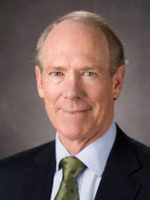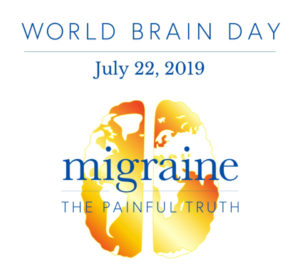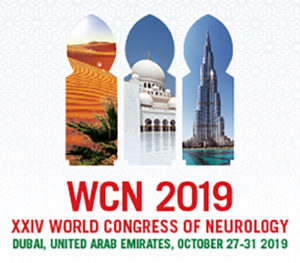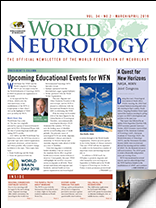World Brain Day (WBD) and the World Congress of Neurology (WCN) are two major events for the World Federation of Neurology (WFN) in which we present our organization to the world.

William Carroll, MD
As we approach the first of these, which is also the 52nd anniversary of the establishment of the WFN, it is appropriate to share what I view as the highlights of WBD 2019, as well as the WCN.

Burj Khalifa, Dubai
World Brain Day
World Brain Day is July 22. The date was originally selected by a group of interested neurologists led by Prof. Mohammad Wasay with the idea of promoting brain health and raising WFN’s profile.
2019 will be our fifth World Brain Day. In previous years, the WFN has selected a particular topic and a related organization to promote awareness, activate interest, and where possible, effect positive change in relation to the topic. These topics have been:
- Brain Health-Age and the Brain
- Clean Air (partnered with the Environmental Neurology WFN Specialty Group)
- Epilepsy (partnered with the International League Against Epilepsy)
- Stroke (partnered with the World Stroke Organization)
This year, Migraine and Other Headache Disorders is the selected topic, and the WFN is pleased to collaborate with the International Headache Society (IHS) in celebrating this WBD.

With the release in November 2018 of the latest figures for the Global Burden of Neurological Disorders, noncommunicable neurological disorders (NCD) dominated the statistics. NCDs are now the leading cause of disability and the second leading cause of death globally. The principle causes of neurological NCDs are stroke, migraine, and Alzheimer’s Disease and related dementias. In Western Europe and Australia, migraine ranks ahead of stroke as a cause of disability.
Given that migraine is a relatively hidden disability, it has not attracted the emphasis that its effect on global health and economic burden indicates it deserves. Consequently, this year’s WBD will highlight the need for concerted action on migraine at all levels. These include individuals with migraine and headache, national health services, patient organizations and neurological societies through to the World Health Organization, which is an active partner in the Global Burden of Disease endeavor. This year’s WBD will also be expanded to enable it to be featured in a number of important events and meetings beyond July 22.
In addition to WBD itself, the IHS plans to promote migraine and other headaches at its meeting in in September in Dublin and at the World Congress of Neurology in October in Dubai. A more prominent promotional campaign for improved diagnosis and individual therapies for migraine will be undertaken in partnership with the IHS, including possibly a two-week advertisement in New York’s Times Square. Senior representatives of the World Health Organization will attend the IHS Meeting in Dublin and the World Congress in Dubai, where it is hoped there will be employee representatives at a press conference on migraine and WBD.
The expanded duration of the public relations effort for migraine and other headache disorders for this WBD is in line with sentiments expressed by members of the Global Neurology Alliance at its meeting during the EAN Congress in Lisbon in June last year. There, one of the desirable objectives of the Global Neurology Alliance was to increase the promotion of brain health and quality neurological care.
It is hoped that this approach will prove successful for both migraine this year and other topics in the coming years. The WFN and the IHS have been most fortunate to have an enterprising team working on this year’s WBD campaign. I thank them all for their hard work and vision. Experience with the WBD platform can be used to grow the public relations effort that is required to promote brain health globally.
XXIV World Congress of Neurology 2019

The World Congress of Neurology (WCN) is the pinnacle of the WFN’s overt promotion of brain health and quality neurological care. This October, the XXIV WCN will be showcased in Dubai by the WFN in partnership with the Emirates Neurological Society and the surrounding region. The WCN rotates through four main regions every eight years. This will be the second time it has been in the North African and Middle Eastern region. In 2011, the WFN partnered successfully with the Moroccan Neurological Society to host the XX WCN.
The 2019 WCN in Dubai promises to encapsulate all that is unique and special for this biennial congress in the region. Every WCN has its own character and cultural features, and Dubai will not disappoint. Located in the Gulf, it is a pivotal and vibrant center reflecting change in modern and established regional lifestyles, culture, cuisine, and neurology.
In addition to the highlights that I mention below, it will also feature a shortened duration in line with the tempo of progress in the world generally and in neurology specifically. Coincidentally, the new WCN format will also keep the faculty numbers lean in order to more appropriately support those who are speaking. At present, the number is 260, down from a high of 300 at the previous WCN in Kyoto.
The faculty has been selected to reflect the advances in the eight main themes of the meeting and also in 25 smaller but no less important topics. The program for each day will begin with an early morning teaching course on a specific topic followed by two high quality plenary lectures. Depending on the day, these are followed by one to three main themes, two to five teaching courses, and one to four scientific sessions, numerous workshops, free papers by topic, regional and specific symposia in a total of 10 to 12 concurrent sessions. There will be 166 sessions over the course of the four-and-a-half-day Congress. Each is thoughtfully planned by the Scientific Program Committee led by Chris Kennard, and each features speakers and chairs nominated by members of the Global Neurology Alliance and the WFN regions with attention to youth and gender diversity.
Stroke, headache, dementia, epilepsy, and demyelinating disorders are appropriately emphasized given their contribution to the global burden of neurological disorders as are topics of regional interest.
The Tournament of the Minds, a popular audience-oriented educational activity, has been revamped and incentives are being offered to the teams from different member societies. Although this tournament is recognized as a valuable learning experience, there has been less willingness for national member team participation over the last few congresses. In an attempt to reverse this trend, the 2019 WCN will offer registration reimbursement (free registration) for nominated teams of four from member societies that attend and also free registration for the victorious team at the XXV WCN to be held in Rome in 2021.
Finally, importantly and in keeping with past congresses, there will be a minimum of 100 travel and expense assistance bursaries offered to young neurologists from low- and low-middle-income World Bank ranked countries. Those interested should check the WCN and WFN websites for details and eligibility.
All in all, these two important events will display the most visible of the high-end educational activities promoted regularly by the WFN and provide the substrate for building collegial interaction and collaborative educational activities beyond the WBD and WCN. There are regular updates posted www.wfneurology.org and disseminated in World Neurology and WFN social media outlets. •
